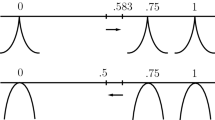Abstract
In this paper we show that lobbying in conditions of “direct democracy” is virtually impossible, even in conditions of complete information about voters’ preferences, since it would require solving a very computationally hard problem. We use the apparatus of parametrized complexity for this purpose.
Similar content being viewed by others
References
Bartholdi JJ III, Orlin JB (1991) Single transferable vote resists strategic voting. Soc Choice Welfare 8:341–354
Bartholdi JJ III, Tovey CA, Trick MA (1989a) Voting schemes for which it may be difficult to tell who won the election. Soc Choice Welfare 6:157–165
Bartholdi JJ III, Tovey CA, Trick MA (1989b) The computational difficulty of manipulating an election. Soc Choice Welfare 6:227–241
Bartholdi JJ III, Narasimhan LS, Tovey CA (1991) Recognizing majority rule equilibrium in spatial voting. Soc Choice Welfare 8:183–197
Bartholdi JJ III, Tovey CA, Trick MA (1992) How hard is to control an election? Math Comput Model 16(8/9):27–40
Christian R, Fellows M, Rosamond F, Slinko A (2006) On complexity of lobbying in multiple referenda. In: Endriss U, Lang J (eds) Proceedings of the 1st international workshop on computational social choice (COMSOC–2006), pp 87–96. Universiteit van Amsterdam, Amsterdam
Conitzer V, Sandholm T (2002) Complexity of manipulating elections with few candidates. In: Proceedings of the national conference on artificial intelligence (AAAI), Edmonton, Canada (to appear) available at http://www.cs.cmu.edu/ sandholm
Diffe W, Hellman M (1976) New directions in cryptography. IEEE Trans Inform Theory IT–22:644–654
Downey RG, Fellows MR (1999) Parametrized complexity. Springer, New York
Dwork C, Kumar R, Naor M, Sivakumar D (2001) Rank aggregation methods for the web. WWW, pp 613–622
Ephrati E (1994) A non-manipulable meeting scheduling system. In: Proceedings 13th international distributed artificial intelligence workshop, Lake Quinalt, Washington, July, AAAI Press Technical Report WS-94-02
Ephrati E, Rosenschein J (1991) The Clarke tax as a consensus mechanism among automated agents. In: Proceedings of the national conference on artificial intelligence (AAAI). Anaheim, CA, pp 173–178
Ephrati E, Rosenschein J (1993) Multi-agent planning as a dynamic search for social consensus. In: Proceedings 13th international joint conference on artificial intelligence (IJCAI). Chambery, France, pp 423–429
Faliszewski P, Hemaspaandra E, Hemaspaandra L, Rothe J (2006) A richer understanding of the complexity of election systems. Available at http://www.arxiv.org/abs/cs.GT/0609112
Garey M, Johnson D (1979) Computers and intractability: a guide to the theory of NP-completeness. Freeman, San Francisco
Hemaspaandra E, Hemaspaandra L (2000) Computational politics: electoral systems. In: Proceedings of the 25th international symposium on mathematical foundations of computer science. Springer-Verlag lecture notes in computer science #1893, August/September, pp 64–83
Hemaspaandra E, Hemaspaandra L, Rothe J (1997) Exact analysis of Dodgson elections: Lewis Carroll’s 1876 voting system is complete for parallel access to NP. J ACM 44(6):806–825
Hemaspaandra E, Spakovski H, Vogel J (2005) The complexity of Kemeny elections. Theor Comput Sci 349(3):383–391
McCabe-Dansted J (2006) Approximability and computational feasibility of Dodgson’s rule. Master’s thesis. The University of Auckland, Auckland
Phillips K (1994) Arrogant capital. Little Brown and Company, Boston
Rothe J, Spakovski H, Vogel J (2003) Exact complexity of the winner problem for Young elections. Theory Comput Syst 36(4):375–386
Author information
Authors and Affiliations
Corresponding author
Rights and permissions
About this article
Cite this article
Christian, R., Fellows, M., Rosamond, F. et al. On complexity of lobbying in multiple referenda. Rev. Econ. Design 11, 217–224 (2007). https://doi.org/10.1007/s10058-007-0028-1
Published:
Issue Date:
DOI: https://doi.org/10.1007/s10058-007-0028-1



